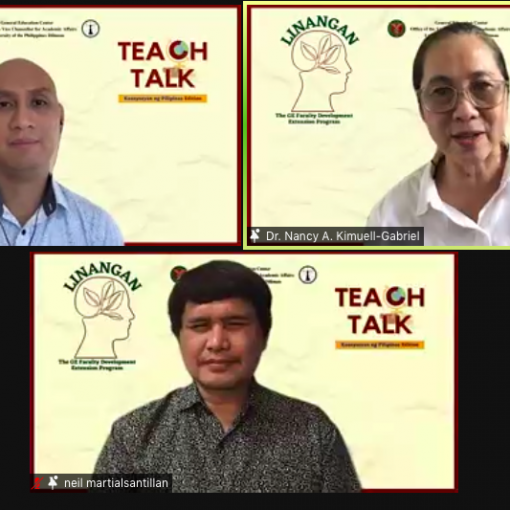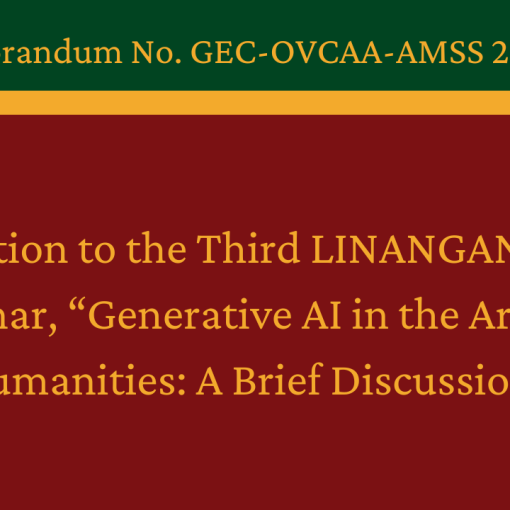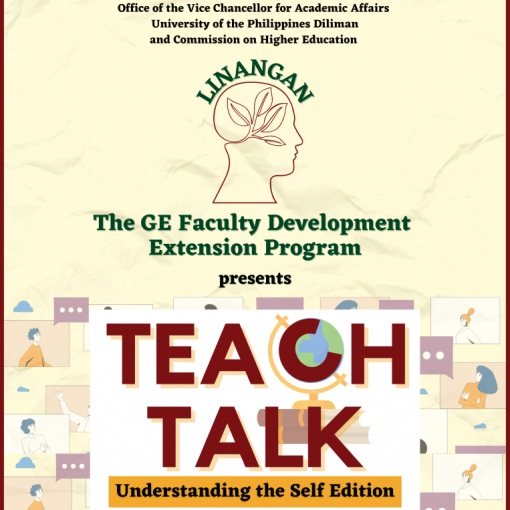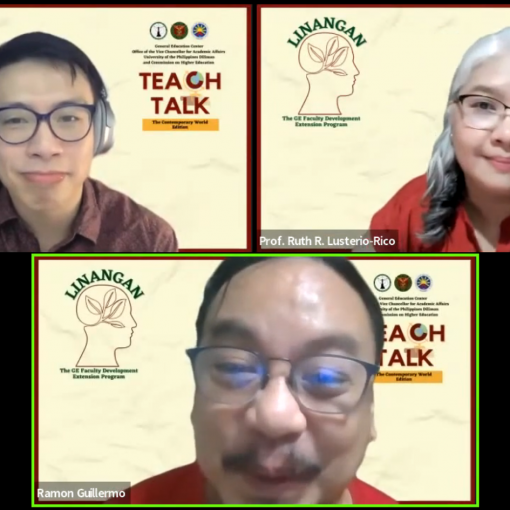How does science affect society, politics, and culture? How do social, political, and cultural values influence scientific research and technological innovations?
These were the questions discussed during the ninth LINANGAN webinar on teaching the GE course Science, Technology and Society (STS). In this webinar, participants shared insights regarding science education, strategies in teaching the subject, and the importance of science to national development.
How is science taught critically? The first speaker, Prof. Benjamin Vallejo of the Institute of Environmental Science and Meteorology, tackled this in his presentation. He opened his discussion by questioning the role and nature of science. Based on Ludwig Fleck’s definition, science cannot be completely objective. Prof. Vallejo explained that the scientific method cannot answer everything, but it can be used to arrive at facts accordingly. The scientific method is vital to counter “alternative facts” which are rampant in society today. Another issue raised by Prof. Vallejo was the predominance of the Western orientation in science. He echoes the Needham question, which inquires why this is the prevailing view, despite the fact that scientific tradition and innovation developed first in China rather than Europe. He also raised the issue of incommensurability, wherein scientific terms are misunderstood or taken out of context. To that end, Prof. Vallejo reiterated the need to strengthen science education to deal with these issues.
On the other hand, the next speaker’s discussion focused on her experiences in conducting science classes. Asst. Prof. Michelle Eusebio of the College of Science shared to the participants how she teaches the UP Diliman GE course STS 1. Since STS 1 covers a wide array of subject matters, Asst. Prof. Eusebio saw the need to invite other professors, even from fields apart from science, to teach specific topics in her STS 1 module according to their specialization. In teaching the course, she cited Michael Smith’s triple definition of science and emphasized the impermanence of scientific knowledge. She also implored participants to discuss not only the impact of science to society, but also the impact of society to science. Various class activities were suggested to help students recognize the interconnection of science, technology, culture, and society. She also posed a question for participants to ponder: did modern science only come from the West?
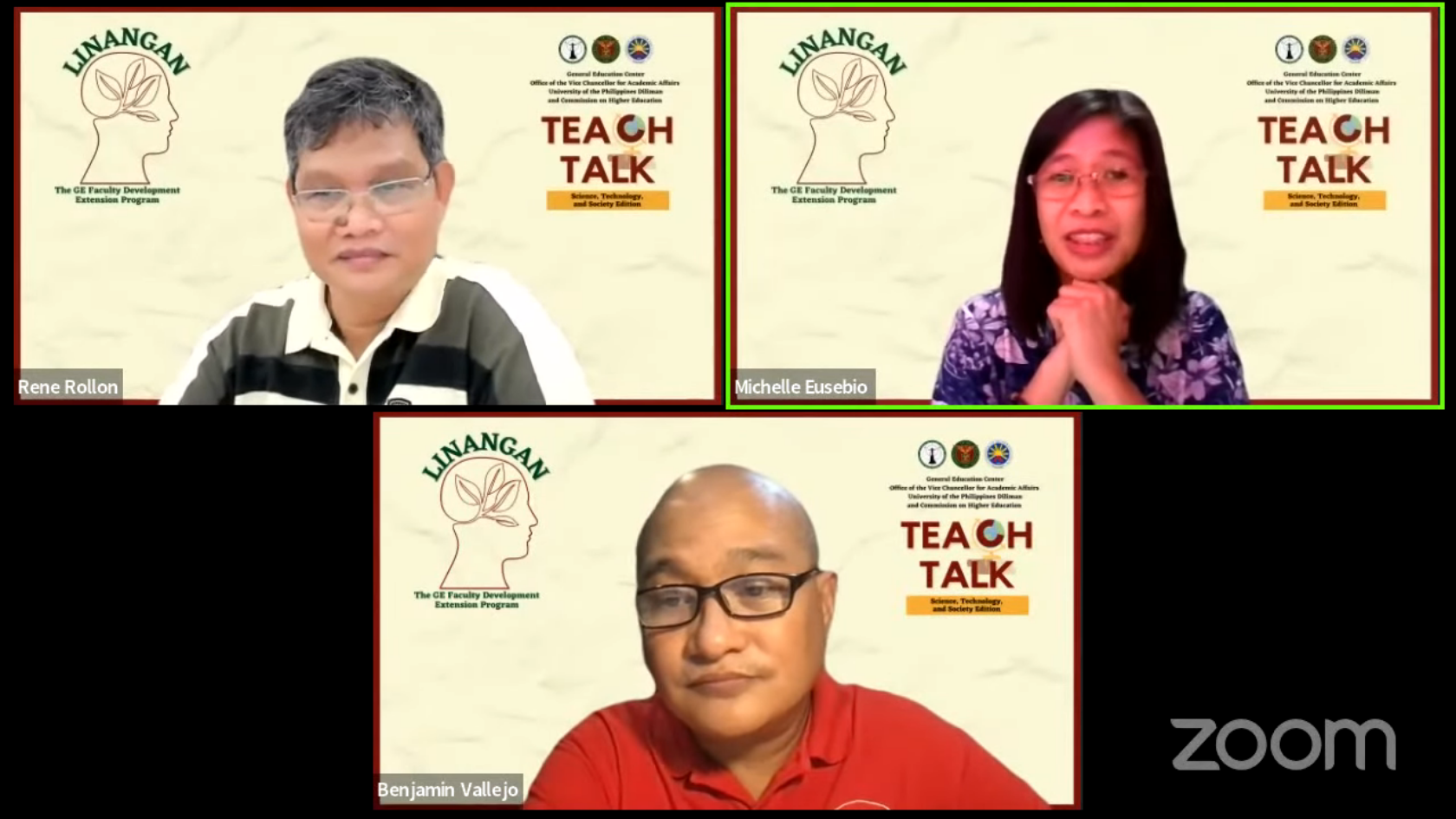
In the open forum moderated by Prof. Rene Rollon of the Institute of Environmental Science and Meteorology, most questions revolved around techniques in teaching STS, class conduct, and assessment. One of these is how to make science education interesting to students. Prof. Vallejo answered that teachers could instill curiosity by asking students how the things they take for granted work. For instance, how does a refrigerator work? Meanwhile, Asst. Prof. Eusebio added that teachers may highlight how science is integrated in other subjects. On the question of how to teach STS, Prof. Vallejo said that teachers must emphasize discussions on how to think about science, while Asst. Prof. Eusebio replied that they can teach topics closer to the student’s experience. Furthermore, questions were also raised about contemporary issues such as gender sensitivity and diversity. Prof. Vallejo implored teachers to include more scientists from marginalized sectors in their class discussions. In this regard, Asst. Prof. Eusebio pointed out that the country has more women scientists and inventors than the global average last 2021. Finally, there was also a question on “alternative facts”. Prof. Vallejo distinguished between misinformation and disinformation, and hoped that the government would do research on the extent of their spread in the country.
In concluding the webinar, Prof. Nancy Kimuell-Gabriel stated that it is crucial to reflect on dominant terms such as “post-truth” and “post-normal”. She also posed questions for participants to reflect: who shall science and technology serve? The answer should be clear: science and technology should serve society — particularly, the Filipino people.
The ninth LINANGAN webinar was conducted last July 8 via Zoom with concurrent livestreaming on Facebook and YouTube. Participants may rewatch the webinar on GEC’s Facebook Page and YouTube channel. They may also register in advance for the last LINANGAN webinar on GEC’s website.

